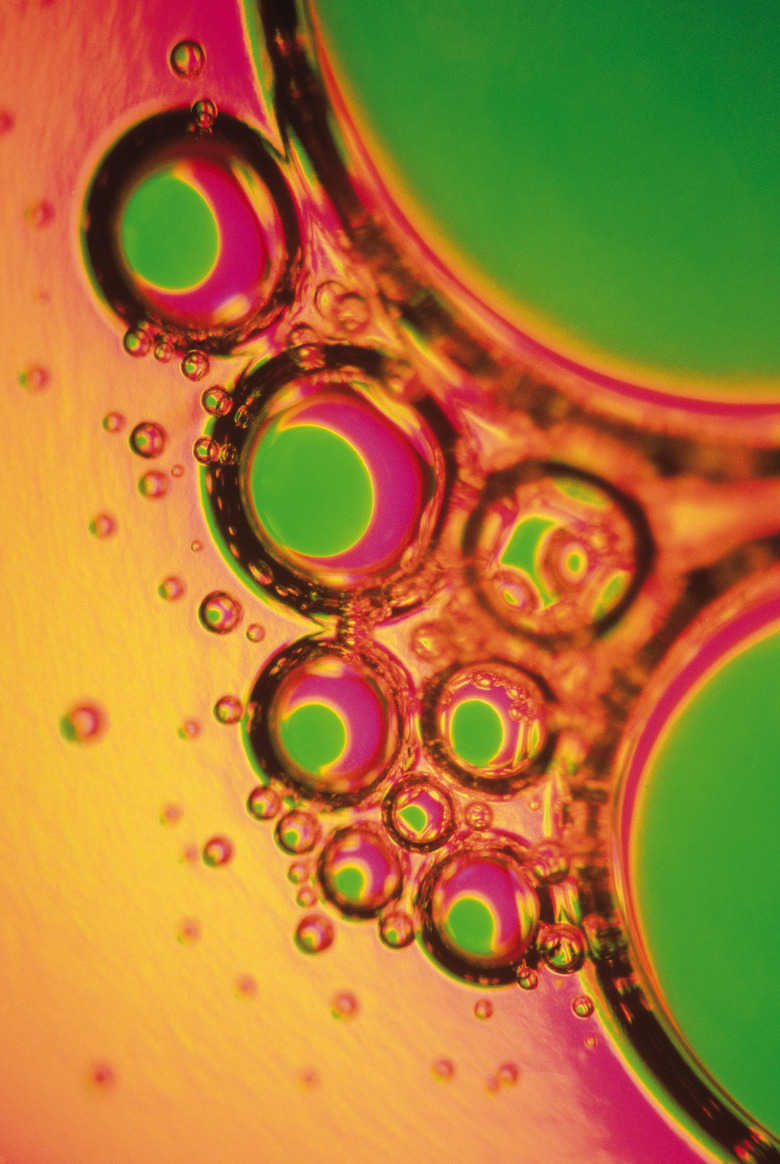Does Acid Dissolve Oil?
Most acids do not dissolve oil because the two types of substances differ chemically. When mixed, the two form two separate layers as water and oil does. You can, however, dissolve one type of oil with another; depending on the oils, the two will make a smooth mixture. Soaps and other substances also dissolve oil, breaking it into tiny droplets with chemical action.
Like Dissolves Like
Like Dissolves Like
When determining if one substance will dissolve another, chemists generally rely on the rule, "like dissolves like." For making solutions, substances fall into two main classes, polar and non-polar, referring to the distribution of a molecule's electric charge. For example, water molecules are bent into a 105-degree "V" shape, putting the oxygen atom on one side and the two hydrogen atoms at the other. The water molecule is more positive on the hydrogen side and negative for oxygen, making the water a polar molecule. Oils, on the other hand, are non-polar; their molecules have the same charge all the way around. Water easily dissolves other polar substances, like sodium chloride salt, but does not dissolve non-polar molecules such as oil. For the same reason, acids, which are polar molecules, generally do not dissolve oil.
Bases
Bases
Bases are reactive chemicals as acids are, although bases lie at the high numerical end of the pH scale, whereas acids have low pH numbers. Unlike acids, bases dissolve oils; for example, sodium hydroxide, a chemical commonly known as lye, turns oils into soap. Lye is a highly caustic base; when it combines with oil, it produces an exothermic reaction, releasing copious amounts of heat.
Surfactants
Surfactants
Detergents and soaps belong to a class of substances called "surfactants," which is a combination of the words, "surface active agent." Surfactants attach themselves to oil molecules by electrostatic attraction, in effect breaking the oil up into microscopic droplets. Because each droplet is surrounded by surfactants, they cannot recombine into larger drops. The surfactant-oil mixture easily washes away with water; this is how soap removes oily grime in everyday use.
Other Substances
Other Substances
A variety of substances will dissolve oil, including gasoline and carbon tetrachloride — both of which have non-polar molecules. Acetone is a special class of solvent called "dipolar aprotic" that, depending on the circumstances, can act as a weak acid or base; it dissolves oil and mixes with water as well.
Cite This Article
MLA
Papiewski, John. "Does Acid Dissolve Oil?" sciencing.com, https://www.sciencing.com/acid-dissolve-oil-7581/. 13 March 2018.
APA
Papiewski, John. (2018, March 13). Does Acid Dissolve Oil?. sciencing.com. Retrieved from https://www.sciencing.com/acid-dissolve-oil-7581/
Chicago
Papiewski, John. Does Acid Dissolve Oil? last modified March 24, 2022. https://www.sciencing.com/acid-dissolve-oil-7581/
